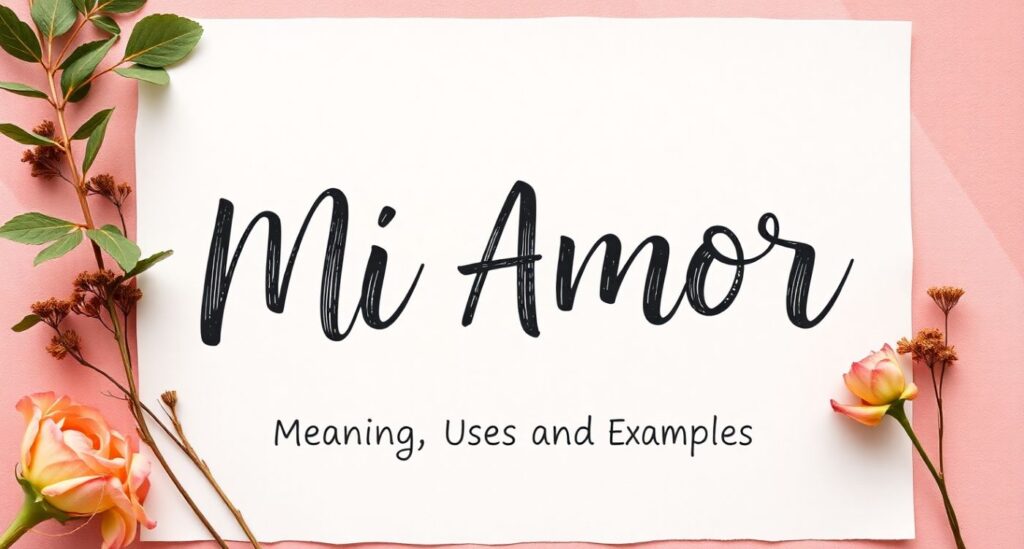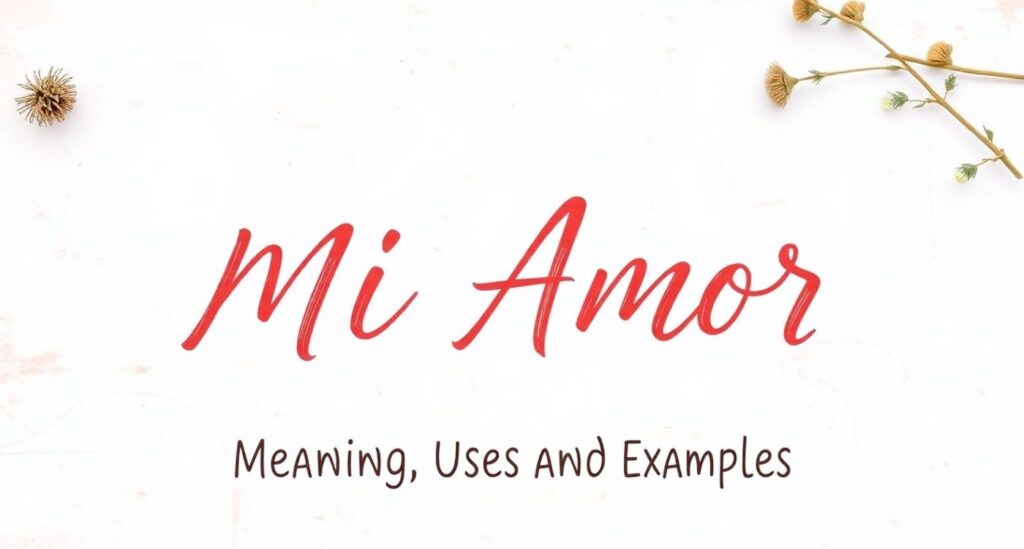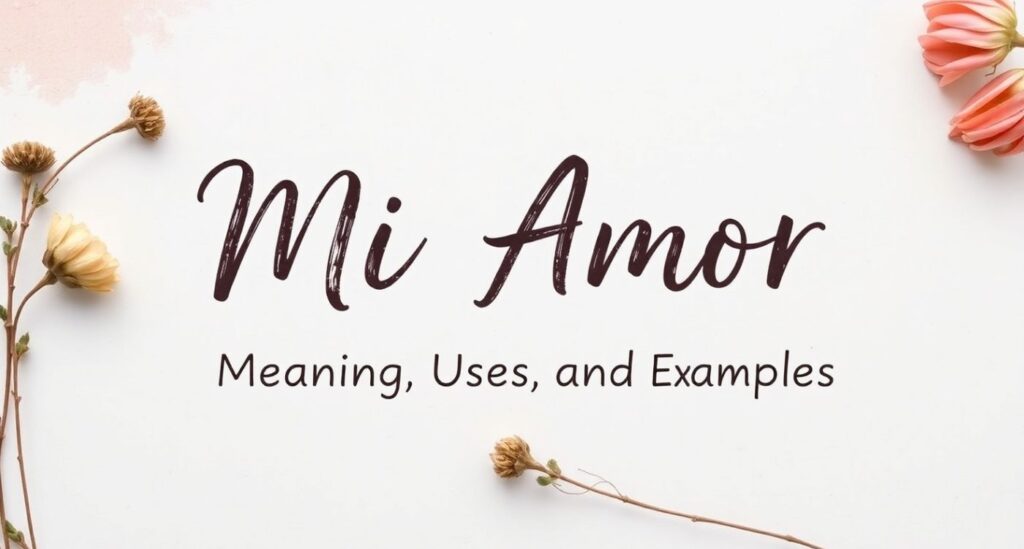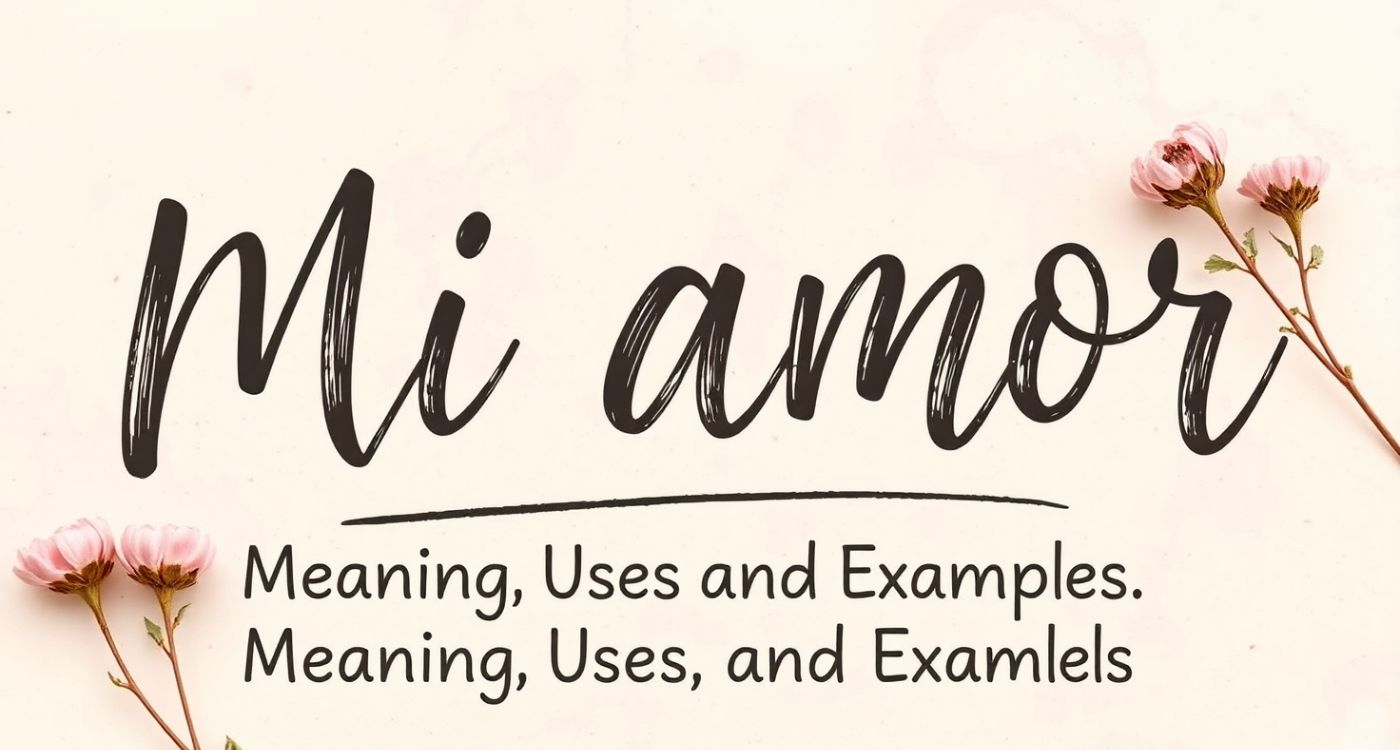If you’ve ever heard someone say “mi amor” in a romantic setting or seen it used in a Spanish-language movie or song, you might have wondered what it means. It’s a term of endearment that carries a lot of emotional weight, and it can make anyone’s heart flutter with warmth.
But there’s more to “mi amor” than just a translation it’s a phrase with rich cultural significance, used in many contexts across the Spanish-speaking world. In this article, we will explore the meaning, uses, and examples of “mi amor,” along with some tips on how to use it appropriately in various situations.
What Does “Mi Amor” Mean?
At its most basic, “mi amor” translates to “my love” in English. It’s a term of affection that’s often used to express deep feelings of love, fondness, or adoration toward someone special.
Whether you’re speaking to a romantic partner, a close family member, or even a dear friend, “mi amor” is a versatile phrase that conveys care and tenderness.
But the meaning of “mi amor” can vary depending on the context in which it’s used, and how well you know the person you’re addressing.
It’s not just for lovers—it can also be used in a platonic way, among family members or close friends.
Breaking Down the Phrase
- Mi: This is the possessive pronoun for “my” in Spanish. It indicates that the speaker is expressing ownership or deep personal connection.
- Amor: This word translates directly to “love” in English. It can refer to the romantic love between partners, but it can also be used for love between family members or friends.
So, when you say “mi amor”, you’re essentially saying “my love,” but the emotion behind it can span a wide range, from the tender love of a partner to the caring affection between a mother and her child.
When Can You Use “Mi Amor”?
“Mi amor” is commonly used in romantic relationships, but it’s far from limited to just that. Below are a few different contexts where this phrase can fit naturally.

1. Romantic Relationships
Of course, one of the most common uses of “mi amor” is between romantic partners. It’s a beautiful way to refer to someone you love, whether you’re in the honeymoon phase or have been together for years. The word expresses affection, passion, and closeness.
Example:
- “Mi amor, te extrañé todo el día.”
Translation: “My love, I missed you all day.”
It’s not just for when you’re together in person; “mi amor” can be a sweet way to show affection in texts or over the phone, especially if you’re in a long-distance relationship.
2. Family and Close Friends
In many Spanish-speaking cultures, it’s not uncommon for family members to use “mi amor” as a way of expressing love. A mother might call her child “mi amor” to show affection, or siblings might use it to express their deep bond.
Example:
- “Mi amor, ¿cómo te fue en la escuela hoy?”
Translation: “My love, how did school go today?”
The phrase can also be used between close friends to express care and tenderness. It’s not always romantic—it’s a versatile term that works for people you feel close to, regardless of the nature of your relationship.
3. In Songs, Movies, and Literature
Spanish-speaking artists often use “mi amor” in songs, poetry, and films to convey deep feelings of passion or longing. It’s a universal way to express emotion in the romantic context, whether it’s a love song or an emotional movie scene.
For example, in the popular song “Mi Amor” by the band RBD, the phrase is repeated as a heartfelt expression of love toward someone important.
4. With Children and Pets
It’s also not unusual to hear “mi amor” used with children or even pets in Spanish-speaking households. When parents want to express love or affection toward their kids, they might say “mi amor” as a term of endearment. Similarly, calling your pet “mi amor” is a way of showing how much you care for them.
Example:
- “¡Mi amor, ven aquí!”
Translation: “My love, come here!”
It’s a term that is meant to create warmth and affection, no matter the age or species!
5. Casual Conversations and Everyday Use
In more casual conversations, especially between people who are close or in a comfortable relationship, “mi amor” can be used without a heavy romantic connotation.
It might be used as an expression of fondness or to show care for someone, such as in the case of friends who have a close bond or partners who have been together for a long time.
Example:
- “Mi amor, ¿quieres café?”
Translation: “My love, do you want coffee?”
This usage shows how the term can be flexible, appropriate for many different relationships and situations.
Different Ways to Express Affection in Spanish

“Mi amor” is far from the only way to express affection in Spanish. While it’s a beautiful phrase, there are many other endearments you can use depending on your relationship with the person, the country you’re in, and the context. Let’s take a look at a few alternatives.
1. Cariño (Darling)
This is a sweet term of affection, and its meaning is quite similar to “mi amor.” It’s often used between couples, family members, and close friends.
- “Cariño, ¿cómo te fue hoy?”
Translation: “Darling, how was your day?”
2. Cielo (Heaven or Sky)
Another affectionate term, “cielo,” literally translates to “sky” or “heaven,” but it’s used in Spanish to call someone your “angel” or “darling.”
- “Eres mi cielo.”
Translation: “You are my heaven.”
3. Corazón (Heart)
In the same way “mi amor” refers to someone you love deeply, “corazón” (heart) is used to refer to someone who is at the center of your affections.
- “Mi corazón, siempre te llevaré en mi corazón.”
Translation: “My heart, I will always carry you in my heart.”
4. Mi Vida (My Life)
This is another very endearing phrase, often used to refer to someone who means the world to you.
- “Mi vida, no sé qué haría sin ti.”
Translation: “My life, I don’t know what I would do without you.”
Each of these alternatives offers its own flavor of affection, but none quite carries the same weight of universal usage and warmth as “mi amor.”
Helpful Tips for Using “Mi Amor”
When using “mi amor,” it’s important to consider a few key tips to ensure that your expression of affection is received warmly and appropriately.

1. Know Your Relationship
While “mi amor” is a wonderful term of endearment, it’s more intimate than casual phrases like “amigo/a” (friend) or “compañero/a” (partner). Use it with people you feel close to, whether romantically, platonically, or familially. If you’re unsure, it’s always safer to start with a less intimate term and see how the relationship evolves.
2. Tone and Context Matter
The tone you use when saying “mi amor” can make a big difference in how it’s received. Saying it in a loving, sincere tone will naturally convey the emotion you intend. However, be cautious when saying it too casually or in an overly playful way, as it could come across as insincere, especially if the relationship doesn’t warrant such a level of intimacy.
3. Cultural Considerations
In different Spanish-speaking cultures, the use of “mi amor” can vary. In some countries, it’s common to use it freely between friends or even strangers (like in some parts of Mexico or Colombia). In others, it’s a term more strictly reserved for romantic partners or family members. Be mindful of regional differences to avoid misunderstandings.
Final Words
“Mi amor” is a simple yet profound phrase that captures the essence of affection, love, and care. Whether you’re expressing your feelings to a romantic partner, a family member, or a close friend, this term resonates with deep emotion. It’s a versatile expression that can be used in various contexts, from the tender moments between parents and children to passionate declarations of love between partners.
The key to using “mi amor” effectively is knowing the person you’re speaking to and understanding the relationship you share. When used genuinely and thoughtfully, it will always have a positive, heartfelt impact. So, whether you’re saying “mi amor” to someone special or simply exploring the beauty of this Spanish expression, remember that love transcends language—and in the case of “mi amor,” it’s always warmly embraced.









